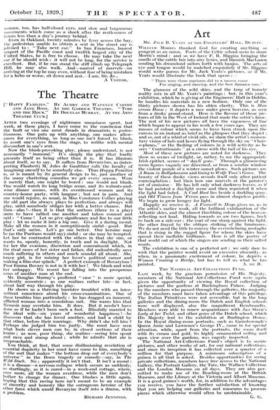The Theatre
[" HAPPY FA3IILIES." BY AUDRY AND WAVENEY CARTON AND JANE ROSS. AT THE GARRICK THEATRE. " TIME AND THE HOUR." BY DOUGLAS MURRAY. AT THE ARTS , THEATRE CLUB.]
AFTER two evenings of nightmare uneasiness spent, last week, at these plays, I have come to the conclusion that the fault or vice one most dreads in dramatists is preten- tious-tzar. One puts up with anything, one makes allow- ances for everything, so long as one isn't forced to blush, to avert one's eyes from the stage, to writhe with mental discomfort in one's seat.
Now the blush-provoking play, please understand, is not necessarily " immoral." It's simply the play that loudly presents itself as being other than it is. It has illusions about itself, so to say. It suffers from Bovaryism, as (inter- preting Flaubert) M. Jules de Gaulthier calls the faculty of imagining oneself to be somebody else. Thus Happy Families is, or is meant by its general design to be, just another of the many chattering comedies we get every season. Were it merely that, one might be bored : one would not blush. One would watch its long bridge scene, and its walnuts-and- wine dinner scenes, with its overdressed women and its country-house party, with languor ' • but not in pain. And one would rejoice, as usual, in Miss Constance Collier playing the old part she always plays to perfection, and always will play, until somebody obliges her with a better chance. But then—alas !—then it is that the authors (three to a play) seem to have rallied one another and taken counsel and said : " Come ! Let us give significance and fire to our little play : let us make it into a big one. Give it a daring moral. Make all the women in it surreptitiously sinful—good. But that's only satire. Let's go one better. Our heroine may be (as the Puritans would say) sinful ; or she may be tempted. Let her be contrasted with the others in that she sins, or wants to, openly, honestly, in truth and in daylight. Not for her the evasions, discretion and concealment which, in the rival eases of her sister and father, did undoubtedly save much suffering in others and much scandal all about. She, brave girl, is for ruining her lover's political career and making a film-star splash. A perfect example of Bovaryism ! Poor Emma Bovary is not in it with her ! We blush and wish her unhappy. We resent her falling into the prosperous arms of another man at the end.
Mr. Douglas Murray's proffered " case " is more special, evidently eccentric ; as one realizes rather late—in fact, about half way through his play.
He shows us a thriving barrister troubled with an inter- mittent conscience about his cross-examinations. One of these troubles him particularly : he has dragged an innocent, afflicted woman into a scandalous suit. She warns him that Nemesis may overtake him. It does. But it needn't have done so if he hadn't been such a fool. Blissfully married to the ideal wife—six years of wonderful happiness !—he discovers that she has loved another, and had a child by that other, before their marriage. Why didn't she tell him ? Perhaps she judged him too justly. She must have seen what fools clever men can be, in closed sections of their brains ; as now, poor thing, she realizes—seeing him spout and rave and stamp about ; while he admits that she is irreproachable.
You think, at first, that some disillusioning revelation of essential duplicity in her must have come to him, something of the sort that makes " the bottom drop out of everybody's universe" in the Ibsen tragedy or comedy—say, in The Wild Duck. No ; apparently it isn't that. It isn't a moral : it is a disease—a nervous collapse which occurs as suddenly, as startlingly, as it is cured—in a week-end cottage, where, once more, all the women overdress, while the men don't bother to change for dinner. One blushes a little again, hoping that this raving hero isn't meant to be an example of Sincerity and honesty like the outrageous heroine of the other farce which would Bovaryize itself into a drama, with a problem.
RICHARD JENNINGS.








































 Previous page
Previous page